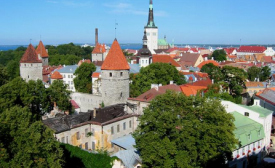hard power
It seems like one reason why Russia’s actions in Crimea appear so jarring and brazen is that it’s a form of warfare that was once common but rarely take place anymore. Russia may not formally annex Crimea – it seems more likely that the territory will declare independence under heavy Russian influence – but it has essentially invaded another country to lob off a piece of territory that was, despite longstanding nationalist sentiment, an undisputed part of Ukraine.
Soft power proponents tend to forget that the purpose of soft power, as with public diplomacy more broadly, is to advance the strategic interests of your country. The goal is not be “nice” or transiently popular, but to advance toward your foreign policy goals. Public diplomats are not social workers, and they should not allow themselves to be seen as such.

“Soft power” is an important element of foreign policy, emphasizing attraction rather than coercion. The concept, popularized by Harvard professor Joseph Nye, provides counterbalance to the infatuation with hard power, especially military force, which has been driven by the accelerated development of “smart” weaponry. Drones, for example, are appealing to their users because their “pilots” may be thousands of miles away, wholly out of danger while people on the ground are dying. It is war without cost for one side.
Soft power proponents tend to forget that the purpose of soft power, as with public diplomacy more broadly, is to advance the strategic interests of your country. The goal is not be “nice” or transiently popular, but to advance toward your foreign policy goals. Public diplomats are not social workers, and they should not allow themselves to be seen as such.
Japan's approval of new national defense guidelines and its first-ever national security strategy are raising questions whether, after a year of focusing on the economy, Prime Minister Shinzo Abe is finally baring his nationalist teeth. The announcement this week of a significant increase in military spending over the next five years to counter China’s growing military influence in the region was not unexpected.
Estonia’s capital seems a peaceful place. Tallinn’s cobblestoned streets are lined by medieval walls and towers, and tourists stroll amid churches and coffee shops. But Estonians live in a rough neighborhood; their eastern neighbor is Russia, which has never fully accepted that Estonia prefers the company of EU and NATO countries.

TALLINN --- Estonia’s capital seems a peaceful place. Tallinn’s cobblestoned streets are lined by medieval walls and towers, and tourists stroll amid churches and coffee shops. But Estonians live in a rough neighborhood; their eastern neighbor is Russia, which has never fully accepted that Estonia prefers the company of EU and NATO countries.







